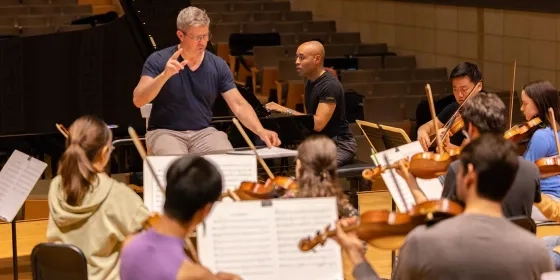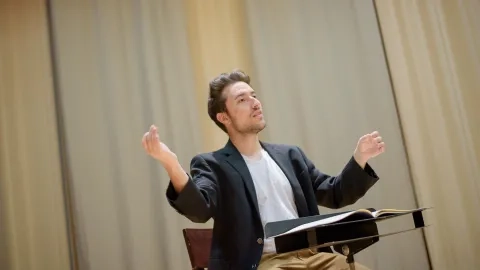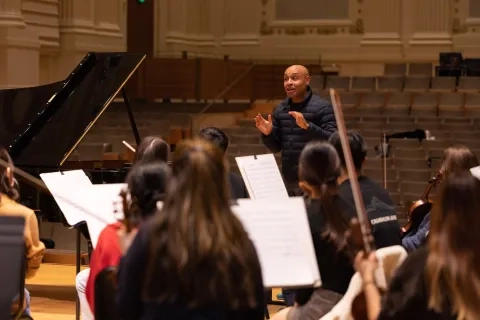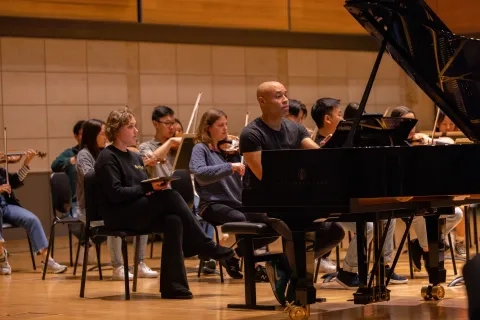Aaron Diehl, Astrology and Nietzsche Come Together at Spring Orchestra Performance
With special guest Opus 3 Artist Diehl, this will also be conducting major David Baker's final performance with the orchestra in an appropriately jam-packed program April 28.
If you're going to bid farewell, doing it with Strauss, Nietzsche, and all 12 signs of the zodiac is a pretty solid way to go out.
Conducting major David Baker's final performance with the SFCM Orchestra is a "bittersweet" one, he says, but it's not a program anyone could accuse of being lackluster. The evening opens with acclaimed jazz pianist Opus 3 Artist Aaron Diehl and his group performing Mary Lou Williams' Zodiac Suite, an ambitious fusion of jazz and classical forms inspired by the signs of the astrological zodiac calendar. After Tchaikovsky's Romeo and Juliet overture, the evening concludes with Richard Strauss' Also sprach Zarathustra, Op. 30, whose booming opening is among the most well-known cues in the repertoire.
"I'm really sad to be leaving SFCM. This is such a big concert, it's really fitting for me to conduct something as huge as the Tchaikovsky," Baker says. But he's taking a more Zen approach to the evening's bombast than one might think: "We tend to look at huge pieces of the rep and open up the score and it can get a little overwhelming. Sometimes you automatically think that you have to do so much with it, but in reality, you just have to really trust what Tchaikovsky wrote on the page and just kind of ride with it a little more."
Because of the small size of SFCM's conducting program, Baker, as the only student in the program this year, has spent his time at SFCM working very closely with the Conservatory's Music Director Edwin Outwater. "I mean, he changed my life," Baker says. "It's been two years of him really pushing me to be the best artist possible."
Diehl, meanwhile, has a long personal history with the Zodiac Suite. After performing some of Williams' works as a student, he developed a relationship with her manager, Father Peter O'Brien, while playing at a church in Harlem. Diehl explained while Williams recorded a trio version of the Suite, the arrangement of it he's been working with since the early pandemic lockdowns actually dates back to a performance Williams did with a much larger ensemble at Town Hall in New York on New Year's Eve in 1945, though it wasn't published until 2011.
The performance was not a success: The musicians were under-rehearsed, and as Diehl later discovered, there were multiple errors made by the copyists in the sheet music. "Williams, in her lifetime, did not have an opportunity to have a full, edited, proofread score" of this arrangement, he said. "And she was really frustrated by that performance, to the extent that she did not really go back. She took a hiatus and did not go back to that particular version anytime in her life."
Diehl began working on the arrangement with his trio and took it on the road, playing it with a number of major orchestras. "It's been a great learning process," he says, "because the trio has done this piece maybe a dozen times, something like that. And because every conductor has a different vision about how certain movements should go, it's about not just finding new ways to approach it, but about how to work together with the orchestra."
Diehl originally pitched the idea of doing the Suite to Outwater in 2021 when he performed with Outwater and the San Francisco Symphony at the Stern Grove Festival. "He said, 'Yeah, let's do it,'" Diehl recalled, "and so he's been very supportive. It's really great to see how he works with the students, and he's just an easygoing guy."
The evening also features a unique non-musical component: For the Williams performance, students will be projection-mapping visuals corresponding to the signs of the zodiac in the Caroline H. Hume Concert Hall, spearheaded by full-time SFCM Studio Coordinator—and Technology and Applied Composition (TAC) master's student—Emma Markowitz.
"We haven't done any projection mapping with jazz yet," Markowitz says, "but I'm working with a couple of collaborators from TAC; we're all going to consolidate a project that is everyone's own individual ideas combined into one cohesive program that goes along and reacts to the audio of the concert."
Using a program called MadMapper, Markowitz explains, allows the visuals to be synced to individual parts of the orchestra. "We'll put a mic on the soloist, for example, and then every time they play, we'll have a visual element that reacts to just them. And we'll have different microphones set up for different parts of the ensemble so we can see the visuals react across the entire group."
With so many moving parts—and the emotions of the evening—to the performance, Baker could quite reasonably be overwhelmed, and though he does allow "it's going to be heavy up there on the podium," he's still philosophical about things. "Conducting an orchestra is such a weird thing because it's pretty much an organism that moves and functions in its own way. So you just have to ride the wave not create, like a disturbance in the Force."
Guests are asked to reserve seats for the April 28 performance. Learn more about studying conducting at SFCM.



